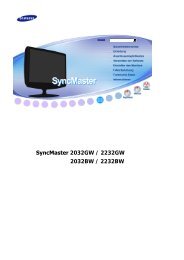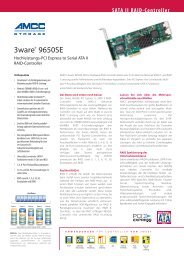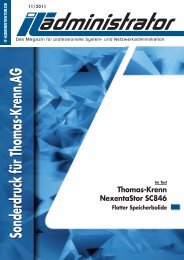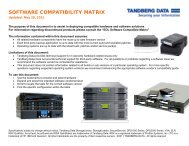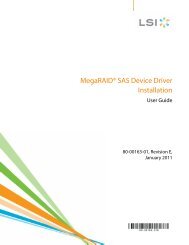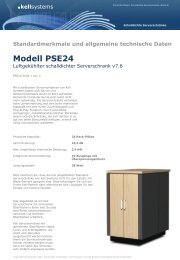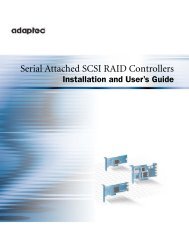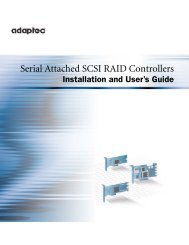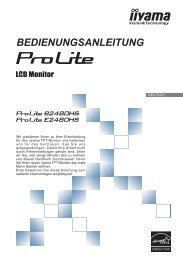Slide 1/17 - Thomas-Krenn.AG
Slide 1/17 - Thomas-Krenn.AG
Slide 1/17 - Thomas-Krenn.AG
Create successful ePaper yourself
Turn your PDF publications into a flip-book with our unique Google optimized e-Paper software.
<strong>Slide</strong> 1/<strong>17</strong>
SSD Caches<br />
Festplatten-RAIDs mit Flashspeicher<br />
beschleunigen<br />
TK Roadshow 2012<br />
<strong>Slide</strong> 2/<strong>17</strong>
Agenda<br />
1) Wann cachen?<br />
2) Definitionen<br />
3) Feature-Vergleich<br />
4) Funktionsweise<br />
5) Performance Tests<br />
6) Fazit<br />
<strong>Slide</strong> 3/<strong>17</strong>
1) Wann cachen?<br />
if(dataSet == known &&<br />
ramAvailable != enough &&<br />
appAccess == analyzed &&<br />
perfTests == available)<br />
CheckForCacheTechnologies();<br />
else<br />
NeedMoreInfo();<br />
<strong>Slide</strong> 4/<strong>17</strong>
2) Definitionen<br />
<strong>Slide</strong> 5/<strong>17</strong>
3) Feature-Vergleich<br />
WB WT WA/read-only<br />
FlashCache<br />
CacheCade<br />
1<br />
MaxCache<br />
2<br />
!<br />
1<br />
Including ForcedWB<br />
! Achtung: Derzeit kein redundanter Cache mit mehreren SSDs möglich<br />
2<br />
Including InstantWB<br />
<strong>Slide</strong> 6/<strong>17</strong>
3) Feature-Vergleich<br />
FlashCache 1<br />
Skip sequential I/O<br />
CacheCade 2<br />
MaxCache 3<br />
●<br />
Das Festplatten-RAID kann für sequentiellen<br />
I/O schneller sein als die SSD<br />
1 Konfigurierbar via sysctl (threshold)<br />
2<br />
Keine weiteren Details bekannt<br />
3<br />
Nicht konfigurierbar, immer ausgelassen<br />
<strong>Slide</strong> 7/<strong>17</strong>
3) Feature-Vergleich<br />
Cache persistence<br />
FlashCache !<br />
1<br />
CacheCade<br />
2<br />
MaxCache<br />
3<br />
●<br />
Das Festplatten-RAID kann für sequentiellen<br />
I/O schneller sein als die SSD<br />
1 Nur WB Cache ist persistent<br />
2<br />
Persistent in alle Cache Modus<br />
3<br />
Dirty Shutdown: WT – discarded, WB – LV failed<br />
<strong>Slide</strong> 8/<strong>17</strong>
3) Feature-Vergleich<br />
FlashCache<br />
Hot spot detection<br />
CacheCade<br />
MaxCache<br />
<strong>Slide</strong> 9/<strong>17</strong>
FlashCache<br />
CacheCade<br />
MaxCache
5) MB/s - read<br />
<strong>Slide</strong> 11/<strong>17</strong>
5) MB/s - write<br />
<strong>Slide</strong> 12/<strong>17</strong>
5) IOPS - randread<br />
<strong>Slide</strong> 13/<strong>17</strong>
5) IOPS - randwrite<br />
<strong>Slide</strong> 14/<strong>17</strong>
6) Fazit<br />
Applikation 2x Erkenntnisse testen<br />
Ergebnisse überprüfen<br />
umsetzen<br />
Yes<br />
No<br />
No<br />
Establish a<br />
Baseline<br />
Know<br />
application<br />
RAM<br />
HDD is<br />
bottleneck<br />
SSD alone<br />
to small<br />
Test<br />
caching<br />
WB<br />
WT<br />
<strong>Slide</strong> 15/<strong>17</strong>
Backup: Test system<br />
●<br />
●<br />
●<br />
SSDs<br />
●<br />
●<br />
Intel Series 320 160GB<br />
Via HPA reduced to 32GB<br />
RAID Controller<br />
● LSI MegaRAID SAS 9260-4i<br />
●<br />
Adaptec 6805Q<br />
Software<br />
● Fio 2.0.7<br />
● Ubuntu 12.04<br />
– Updates from Release Day<br />
<strong>Slide</strong> 16/<strong>17</strong>
Backup: Test script<br />
●<br />
●<br />
●<br />
●<br />
●<br />
●<br />
●<br />
●<br />
●<br />
flashcache_create<br />
●<br />
Create a WB caching device<br />
cache_all=0<br />
●<br />
Don't cache ext4 initialization<br />
mkfs.ext4 -q -E lazy_itable_init=0,<br />
lazy_journal_init=0 /dev/mapper/fc-root<br />
mount /dev/mapper/fc-root<br />
cache_all=1<br />
Call fio<br />
umount /dev/mapper/fc-root<br />
dmsetup remove<br />
flashcache_destroy /dev/sdd<br />
<strong>Slide</strong> <strong>17</strong>/<strong>17</strong>



